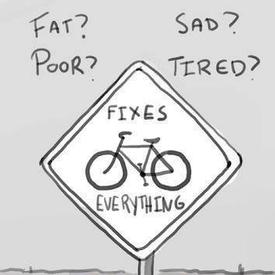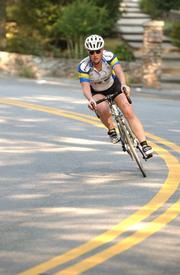Bikes

bstamps12
Posts: 1,184 Member
So I determined today my budget for a bike is $800. Should I go with a tri bike or a road bike? I don't ever race in bike only events and I don't ride in a group, so the aerobars of a tri bike not being "acceptable" in group rides isn't an issue. I could also just get the clip on aero bars for a road bike. What are the pros & cons of a road bike versus a tri bike? Which one should I get considering I'll only use it to train for tri's and in tri races? Any favorite brands in that price range? Features to make sure I get?
Also, I'm going to get fitted for a bike on Wednesday. I've heard this bike shop is very reputable but what should I make sure they look for/measure/etc.?
Thanks in advance!
Also, I'm going to get fitted for a bike on Wednesday. I've heard this bike shop is very reputable but what should I make sure they look for/measure/etc.?
Thanks in advance!
0
Replies
-
I am very interested in the responses.
TOP0 -
For a proper FIT, you'll need to already have your bike. Bike geometry between Tri and Road bikes are different, so it won't be a one size fits all.
Price point, I'd go with a road bike (for various reasons), you can usually get more bike for your money at the lower end on the price scale. You may find a smoking deal though.
FELT has a decent tri bike that one shop I know really likes at that price point. The folks there are solid riders and triathletes and know their gear and have told me a few times that the bike is the best value for the money hands down. I haven't ridden one though so I can't give personal experience.
S0 -
So I need to just buy the bike for my height range, then all the other adjustments will come after I have the bike, right? Thanks for the info!0
-
They will help you! Your knee should not ever go ABOVE your hip while peddling. I bought a SPECIALIZED, hybred. It's in between a road-off road. Tire size is about in the middle. And it was under 800! Just like a CAR, If you get 'last years model' they are also cheaper!! Some bike shop can '****er' with prices so don't be afraid to ask, they took 200 off friends bike cause it was a '09 but looked just like my '10!
Also tests bikes out, know your 'size' then shop around...You could probably get a killer deal in middle of winter, also on CRAIGSLIST!
Sarah0 -
I strongly disagree, at least with the first part. Any good shop will but you on a fitting machine and get your numbers. They will then pick the bike (with teh right stem, bars, etc) to fit you. The second part is true however... geometry between the 2 bikes is very different.For a proper FIT, you'll need to already have your bike. Bike geometry between Tri and Road bikes are different, so it won't be a one size fits all.0 -
NO!!! Do not do this! Your budget may force you to if you decide to go new, but this should not be your goal! At the very least get fitted first and have the shop give you an idea of your stack/reach and what bikes might be good for you.So I need to just buy the bike for my height range, then all the other adjustments will come after I have the bike, right? Thanks for the info!0 -
Your budget is going to limit you if you want to go with something new. If I were in your shoes, I'd look for something used that is a little better rather than something new that is a little lower end. You can get a solid tri bike for that money if you're patient, but going new will get you all entry level stuff, which I'd avoid if I were in your shoes (wheels and shifters esp).
As for tri vs road, it's up to you. This may sound like an odd question, but are you a good rider? Tri bikes are SO stiff and your weight is SO far forward and the head angle is SO steep that they can be really twitchy. I'm a pretty experienced rider and it took me a few long rides to really get comfortable on the bike.
IMO, it really comes down to this... a road bike will likely have a significant (i.e. noticeable) advantage in comfort. The tri bike will be slightly faster (i.e. probably not noticeable in shorter races, minor at best in medium races).
If it were me with your budget, I'd buy the best bike I could for the money... be it a road bike or a tri bike.
Good luck!
.0 -
Thanks Jackson--I am NOT a good rider. I knew the geometry was very different between the 2 bikes but couldn't find (through google anyways) what difference the geometry made based on my riding experience. The bike is my weakest leg by far. For now, I am doing sprint tri's and maybe an Olympic distance tri. By the time I would be ready to do a Half Ironman, I'd have a lot more than $800 for a bike and would upgrade significantly. My dad, who is an avid road cyclist, has found a new bike for me but it is a 2009 model so significantly cheaper than the sticker price of a "new 2011-2012" bike. It's a road bike and I'm really looking at going that route now.0
-
Unless you plan on being super competitive, a tri bike is overkill and like Jackson said, it takes getting use to. I have both a road and tri bike, and right now, the difference in speed is not even noticeable. But in time as I train more and get more efficient with the tri bike, that's when I'll see the difference.
I plan on being competitive (not just a participant) in the local sprint series in 2012.0 -
I believe that the best fit comes BEFORE buying a bike. Get your LBS to fit you first, then they can help you figure out which bike and/or style is best for you. Truth is, not only do different styles of bikes have different fits, but different brands within each style differently, too. So, for instance, Cervellos will have a more aggressive fit than say Kestrels.
Also, if you go to bike shops, and get on different bikes, it's probably a good bet that you're NOT - repeat NOT - going to feel the most comfortable on the bike that fits you the best. It sounds wrong, but it's not. When you test ride a bike, it's not fit to you. It's just roughly adjusted to your hip height. So be wary of wanting the first bike that feels good on a test ride.
Probably, with your price point, tri bikes are out. Those things start high and get higher, relatively speaking. A good quality road bike is probably more in your price range. Saying that, I ALWAYS prefer my tri bike to my road bike. Always.
You might want to think about a cyclocross, or cross bike. Blasphemy, I know. However, their geometry is similar to a road bike, you can put aero clip ons on them (assuming their brakes permit it), and the bike itself has a more versatile range of uses. Bianchi, Kona, and Raleigh make some good cross bikes close to your price range.
I hope this helps.
Joe0 -
There has been some great solid advice given!
I will offer my point of view from personal experience which may or may not help you. I was similar to you several years ago. The bike was my weakest link and I was only interested in Tri's. However, when choosing a bike, I went for a road bike. For me, it was more important to learn bike handling skills and riding etiquette before jumping on a tri bike. Tri bikes are a bit tricky and I can't imagine the difficulty I personally would have experienced by starting out on a tri bike.
About a year later I upgraded to a high end tri bike and I have very happy with my decision. I am thankful I bought mt road bike first because I would not have know what I was looking for in a tri bike.
Best of luck in your decision!0 -
I bought my bike last March. My first tri was in August. I did not want to spend a lot on a bike. I went with a road bike. It is the Trek Lexa. It is designed for women. I had a fitting done before I bought it, and spent @ 900. I agree that you should be fitted for the bike before you buy.0
-
I just realized I never responded with what I ended up with:
2012 Jamis Ventura Comp road bike. I LOVE it. Thanks for all of the advice, it really made me more confident about choosing road bike over tri bike. I've only had 1 ride on it so far (its so cold...cant stand the wind chill!) but it's my pride & joy 0
0 -
Good choice. Jamis are nice bikes. My tri bike is a Jamis Comet.
 0
0 -
nice choice! glad you love it, now grab a trainer and get some indoor spinning done to a Spinervals dvd if the weather is nasty
 0
0 -
Good choice, I have a Jamis Comet. I considering buying a Jamis Road Bike this year.0
-
I love my areobars! I have a road bike with them added on. It makes for a comfortable ride.0
-
So I determined today my budget for a bike is $800. Should I go with a tri bike or a road bike? I don't ever race in bike only events and I don't ride in a group, so the aerobars of a tri bike not being "acceptable" in group rides isn't an issue. I could also just get the clip on aero bars for a road bike. What are the pros & cons of a road bike versus a tri bike? Which one should I get considering I'll only use it to train for tri's and in tri races? Any favorite brands in that price range? Features to make sure I get?
Also, I'm going to get fitted for a bike on Wednesday. I've heard this bike shop is very reputable but what should I make sure they look for/measure/etc.?
Thanks in advance!
I used to work in a cycling shop and am an avid rider and triathlete, so anytime you have questions just message me!!!
First of all, I would recommend a road bike over a TT bike (for now). A road bike provides more versatility and comfort. When you purchase a TT bike, you are limiting yourself and so you would only want to do that when you are a committed triathlete. Road bikes handle all sorts of terrain much better than TT bikes (i.e. I would NEVER take my TT bike to ride in the N. Georgia mountains as I do a few times each summer). The TT bike is simply too specialized for the average rider even if you are going to do triathlons. You are meant to get into the aerobars and limit movement to and from. They are also generally more expensive. Most likely you will not find one in that price range unless it's used. I have always had a road bike and did not purchase a TT bike until I had committed myself to doing a Half Ironman. A road bike is enough for shorter distances. If you want the advantages of a TT bike, the clip on bars will help. If you do plan on doing a distance such as the half, then go with the TT bike.
There are many bikes available in that price range, although it will definitely be the bottom entry level unless you are buying used. Specialized, Trek, Scott, and Felt are great brands. There are many of them though as long as you stick with a pro shop and stay away from big box stores. Cervelo and Specialized make the best TT bikes IMHO.
As far as features and thing to measure during your fit, it depends on what you are buying, so message me and we can talk more!0 -
I strongly disagree, at least with the first part. Any good shop will but you on a fitting machine and get your numbers. They will then pick the bike (with teh right stem, bars, etc) to fit you. The second part is true however... geometry between the 2 bikes is very different.For a proper FIT, you'll need to already have your bike. Bike geometry between Tri and Road bikes are different, so it won't be a one size fits all.
Yes and No.... You need to get a preliminary fit to determine what size/characteristics to buy and then fit again to dial in your purchase. Does that make sense?0 -
2 things.
I have a Giant Trinty A2 I love it. I didnt get fitted but I did a ton of research a head of time. I plan to get professionally fitted this spring. I have made a tremendous amount of adjustments and tweaks on my own to the bike and in both my races I was very comfortable. Still I would suggest you get fitted.
I found my bike for an incredible price so I couldn't pass it up. I wouldn't suggest you go in to a Tri bike but I wouldn't discourage you not to. you are in the same place as me. You know what your going to ride for why by the dual purpose bike when you can potentially get more benefit from tri specific. However... I've been whooped by people on road bikes. and in my first Team Tri Early last year I was just trounced by a guy albeit 50 lbs lighter then me on a Old steel road bike.
One more thing...I promise you there will be people that will be on road bikes in a HIM.0 -
One more thing...I promise you there will be people that will be on road bikes in a HIM.
Matter of fact, you see them in the full Ironman as well... Just not that often. It can be done.0 -
I've just been on MFP for a week and you've all been a great source of inspiration. I wish I had found this site a long time ago. Thanks! I did my first sprint tri in August 2010 and dusted off my vintage 1992 Trek 1000. It has several thousand miles on it from the years after I purchased it. Sadly, it went into a closet when I moved to Atlanta and became afraid to ride. A friend borrowed it for a tri in early 2010 and inspired me to start riding again. Now that it's been tuned up, has clip-on aerobars, modern clipless pedals, and a new computer, it's great for training and long fundraiser rides. For racing, it needs more gears at the very low and high ends, shifting levers on the handlebars rather than the bottom bar of the frame, and although the frame and fork are aluminum, the aerobars alone weigh 2 pounds.
When I started tri's, I told myself that I would consider upgrading the bike if I stuck with it for two years. Now I'm also tying in my weight loss and maintenance goal to the upgrade, so next spring is probably the earliest that a new bike is in my future. Biking is my strongest and favorite leg of racing though, so it's fun to think about.
Questions about tri bikes... How much difference does a carbon frame make in terms of speed and comfort? Is it worth the additional cost and risk of cracks? Are there sources for summary information about various tri bike manufacturers and their relative aggressiveness in frame geometries? reviews of components? What are some things I should pay attention to when on a test ride? I'm reading "Zinn and the Art of Triathlon Bikes" and it's a bit overwhelming. Cheers and happy swimming, biking, and running, -Kathy0 -
Questions about tri bikes... How much difference does a carbon frame make in terms of speed and comfort? Is it worth the additional cost and risk of cracks? Are there sources for summary information about various tri bike manufacturers and their relative aggressiveness in frame geometries? reviews of components? What are some things I should pay attention to when on a test ride? I'm reading "Zinn and the Art of Triathlon Bikes" and it's a bit overwhelming. Cheers and happy swimming, biking, and running, -Kathy
Carbon won't be any faster. All other things equal, it can be a bit lighter, which can affect your time over a long (or hilly) course, but that's more a factor of the weight of the bike than the frame material. Comfort will vary bike to bike depending on geometry, fit, and the individual frames. An AL bike that fits you well will be far more comfortable than a carbon bike that doesn't. If both fit well, you'll likely notice the carbon being more comfortable the longer you ride (i.e. you might not notice a difference over 5 miles, but probably will over 50 miles).
Risk of cracks aren't all that great on road bikes as they see far less stress than a mountain bike. IMO, stress damage on a road bike isn't a concern. That said, if you crash the bike and it takes a serious hit, carbon has much less resiliency than does AL or steel. Entry level carbon frames are much cheaper than they used to be, and assuming a reputable manufacturer, they are also much higher quality than they used to be, so I wouldn't worry about carbon reliability/durability on a road/tri bike.
Generally the geometry from bike to bike is going to be pretty similar. What really matters is the reach and stack, which are things you'll have to be fitted for. Once you know those, you can go to the manufacturer's website and look at the geometry on different bikes and find the ones that should (on paper) fit you best. I don't know of any sites that compare geometry across several bikes/brands.
Test rides are hard because they are generally so short. I'd pay attention to saddle comfort (which to a large extent is something you'll have to grow into), and weight/fatigue in your arms/shoulders when you're down on the aero bars. Aside from those things, all you can do is trust the shop to fit you to the right bike. IMO, this is where having a good relationship with a quality bike shop is most beneficial.
.0 -
All the info out there is really quite overwhelming.
I went from an aluminum road bike to a carbon tri bike. The difference for me was night and day. That said an aluminum tri bike that fits will be faster than a $10k superbike that doesn't. So find a knowledgeable tri specific shop in your area and get fit for a bike BEFORE you buy. I found that Cervelo, Felt, and several other brands wouldn't work for my body type. Trek, Specialized, Orbea, and a few others would. So I waited for a sale and grabbed a $3k Orbea Ordu for $2k. The same fitter that pre-fit me, then set my tri bike up specifically for me.
Good resources for info would be places like beginner triathlete .com. Also find guys/gals in your local tri clubs to ask. Personally I wouldn't go under the 105 grouppo Shimano wise or the Sram Rival set.0 -
Questions about tri bikes... How much difference does a carbon frame make in terms of speed and comfort? Is it worth the additional cost and risk of cracks? Are there sources for summary information about various tri bike manufacturers and their relative aggressiveness in frame geometries? reviews of components? What are some things I should pay attention to when on a test ride? I'm reading "Zinn and the Art of Triathlon Bikes" and it's a bit overwhelming. Cheers and happy swimming, biking, and running, -Kathy
Carbon won't be any faster. All other things equal, it can be a bit lighter, which can affect your time over a long (or hilly) course, but that's more a factor of the weight of the bike than the frame material. Comfort will vary bike to bike depending on geometry, fit, and the individual frames. An AL bike that fits you well will be far more comfortable than a carbon bike that doesn't. If both fit well, you'll likely notice the carbon being more comfortable the longer you ride (i.e. you might not notice a difference over 5 miles, but probably will over 50 miles).
Risk of cracks aren't all that great on road bikes as they see far less stress than a mountain bike. IMO, stress damage on a road bike isn't a concern. That said, if you crash the bike and it takes a serious hit, carbon has much less resiliency than does AL or steel. Entry level carbon frames are much cheaper than they used to be, and assuming a reputable manufacturer, they are also much higher quality than they used to be, so I wouldn't worry about carbon reliability/durability on a road/tri bike.
Generally the geometry from bike to bike is going to be pretty similar. What really matters is the reach and stack, which are things you'll have to be fitted for. Once you know those, you can go to the manufacturer's website and look at the geometry on different bikes and find the ones that should (on paper) fit you best. I don't know of any sites that compare geometry across several bikes/brands.
Test rides are hard because they are generally so short. I'd pay attention to saddle comfort (which to a large extent is something you'll have to grow into), and weight/fatigue in your arms/shoulders when you're down on the aero bars. Aside from those things, all you can do is trust the shop to fit you to the right bike. IMO, this is where having a good relationship with a quality bike shop is most beneficial.
.
I will say that as far as carbon vs. aluminum having just switched I find the carbon lessens any vibration much more effectively than aluminum. If you ride chip seal/rough roads I'd highly recommend carbon for comfort.0 -
I will say that as far as carbon vs. aluminum having just switched I find the carbon lessens any vibration much more effectively than aluminum. If you ride chip seal/rough roads I'd highly recommend carbon for comfort.
^^ This ^^
I went from an aluminum frame to a carbon frame this year and I notice less vibrations right away. I love it!0 -
Thanks for the suggestions and the reminder of the importance of fit. Even for a woman, my legs and arms are long relative to my torso. At 5' 7", my legs are only an inch or so shorter than my brother's and he's 6' 2". Along with all the other improvements in bike technology over the past 20 years, I'm hoping I'll be able to find a bike that accommodates my proportions. Getting a taller seat post may be part of the solution, but this also makes the reach longer. Ahh... a puzzle :-)0
-
Thanks for the suggestions and the reminder of the importance of fit. Even for a woman, my legs and arms are long relative to my torso. At 5' 7", my legs are only an inch or so shorter than my brother's and he's 6' 2". Along with all the other improvements in bike technology over the past 20 years, I'm hoping I'll be able to find a bike that accommodates my proportions. Getting a taller seat post may be part of the solution, but this also makes the reach longer. Ahh... a puzzle :-)
You seem to be the tall and narrow frame set then. Speed Concepts would be good options. Specialized Shivs are highly adjustable. Cervelos, Felts, QRs fit more long torso type folk.0 -
You seem to be the tall and narrow frame set then. Speed Concepts would be good options. Specialized Shivs are highly adjustable. Cervelos, Felts, QRs fit more long torso type folk.
Good to know. As the bike becomes more compact, does it also get twitchier especially in the aero position? As far as tri-bike shops go, there are several in the area. I also have a friend who competes in time trials semi-professionally and he has offered to take me bike shopping. However, he's a total gear-head and my concern is that he would talk me into more bike than I really need.0 -
Revisiting the bike question again - I just went to All3Sports and got measured for a tri bike. Woo Hoo :-) As expected, my legs are long and torso is short. Top picks for my measurements and budget are the Scott Plasma II and the Blue Triad EX. All3 Sports doesn't carry Specialized Shiv's and I haven't checked models/pricing yet, but it would also be a good choice. Farther down the list are the QR Lucero Lite (high bling factor), Argon E112, and Cervelo P2. It was definitely much appreciated soft-sell customer service, but the shop seemed to be suggesting that the Plasma would be my best bang for the buck. I haven't actually test ridden any of them yet, but I'd like to have some ideas of what to look for when I test them. I'll also check the blogs on beginner triathlete and slow twitch. Any suggestions or comments?0
This discussion has been closed.














